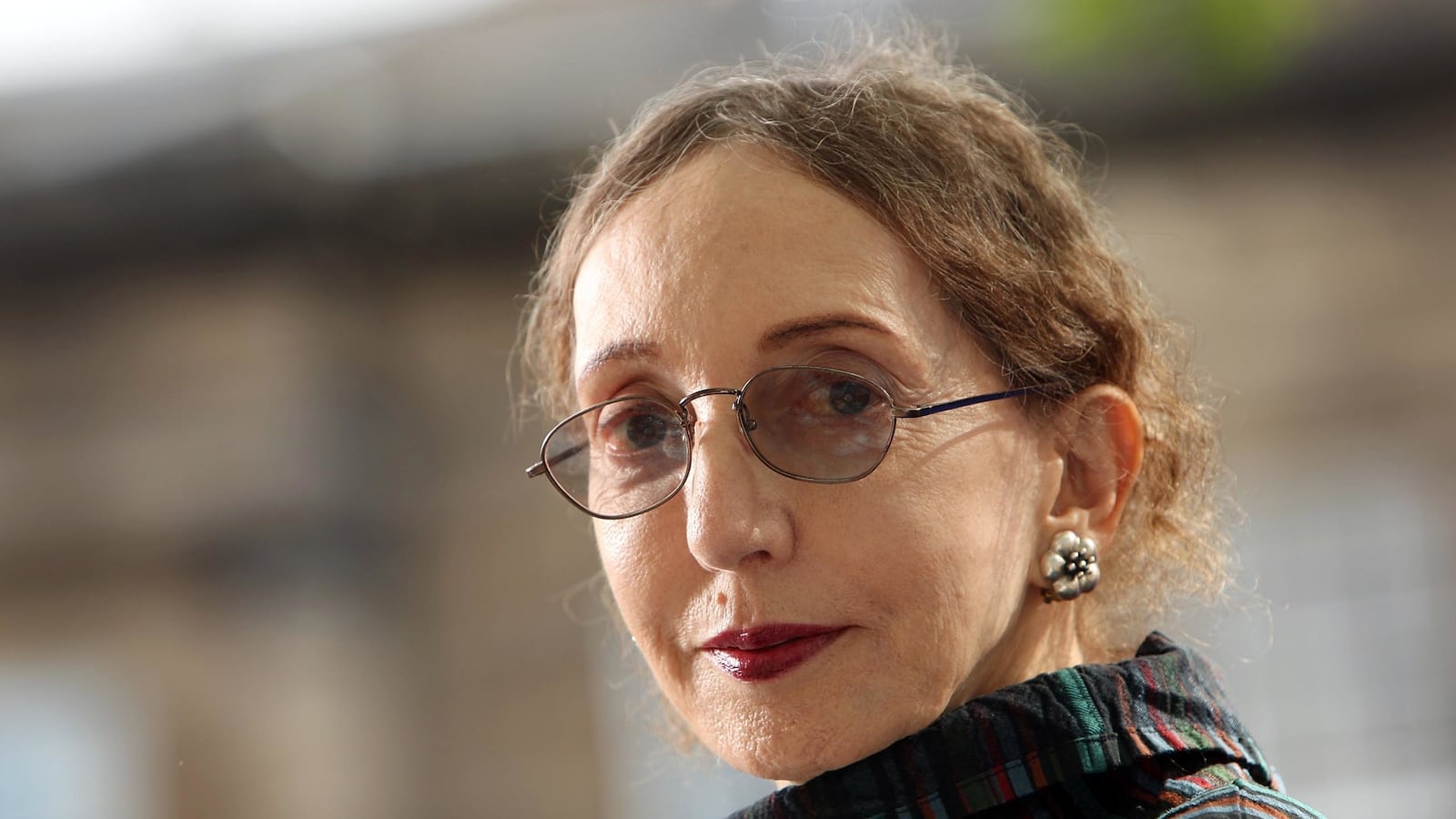For 50 years, Joyce Carol Oates has maintained a creative dialogue with contemporary American culture, writing unflinchingly about our obsessions and oddities, our villains and heroes, our hidden and troubled past. She has filled our shelves with literary, Gothic, mystery, and romance fiction (not to mention poetry, memoir, criticism, and memorable essays on boxing), and earned nearly every literary award but the Nobel.

Her new novel, The Accursed, is the fifth in her series of Gothic novels that began in 1980 with Bellefleur. This time around, Oates immerses three U.S. presidents (Grover Cleveland, Woodrow Wilson, and Teddy Roosevelt), two legendary writers (Upton Sinclair and Jack London), and the community around Princeton University in a seething stew of class conflict, racial tension, and supernatural effects. Her central image is the Crosswicks Curse, which torments one of Princeton’s founding families, haunting them with demons and vampires, visions and voices. At one point the devil himself abducts a bride from the altar, carrying Annabel Slade off to the Boglands to satisfy his Unspeakable appetites.
Woodrow Wilson figures prominently in The Accursed as the beleaguered president of Princeton. Wilson was the primary focus of our email discussion.
What made you think of Princeton as the setting for a gothic novel?
As soon as I moved to Princeton in 1978, I became fascinated by local history, much of it Revolutionary War-era; and I became fascinated by the presidency of Woodrow Wilson at Princeton University. The phenomenon of the rich white Christian community that becomes afflicted by a "curse"—the emergence of the repressed, the denied, and unconscionably cast-off moral responsibilities to protect Negroes—(as African Americans were called at the time) from the harm of racist threats, intimidation, and mob violence. White Christian leaders might have spoken out against racism, and against extremist groups like the Ku Klux Klan, but did not. The Accursed is also about the roiling struggle of women's rights—politically, socially, psychologically, sexually. Wilhelmina and Annabel are heroines, of a kind. And they don't surrender romance and love, but end the novel married, we are to assume happily.

You wrote a draft of The Accursed in the early 1980s, then abandoned it. Why did you wait thirty years before returning to it? Did you use a new focus while working on the final draft?
I'd returned to the manuscript a number of times over the years, worked on it but set it aside; the challenge was to find a point of entry, a narrative "voice" that wasn't so 19th century, and a structure that could accommodate numerous characters and perspectives. I had not ever "abandoned" the novel—it was rather more that I wanted to totally rewrite it, but had not quite the key to structuring the story. For some reason, in 2011, when I returned to the manuscript and began to work, fortified by recent reading in the racism of the era, including James Cone's memorable The Cross and the Lynching Tree, I was able to focus the story in a way that was dramatically powerful, to me.
Of course, many elements contribute to a "gothic historical" novel, including always the contemporary scene in which, in this case, we have a black President for the first time in history. I could have had no idea that this was in store, in 1984. How utterly astonished the self-regarding white people of 1905-06 would have been, if they'd known what lay ahead—not only racial integration, women's voting rights, the (theoretical) equality of the races and the sexes, but, yet more astonishing, the presence of undergraduate women at Princeton University, women faculty, and a woman president...
One of your narrative threads is the ongoing battle for the presidency of Princeton, with Woodrow Wilson squared off against Dean Andrew Fleming West, a candidate supported by Grover Cleveland, recently retired from two terms as president and serving as a Princeton trustee.
The feud of Woodrow Wilson and the popular graduate dean West is well known. It consumed the university community at the time, and quite defeated Woodrow Wilson, who was also flummoxed by failed efforts to lessen the popularity of eating clubs on campus. In my office on the sixth floor of New South Building, I can look out the window and see the Graduate School on a hill not far away, symbol of the triumph of Dean West. Having failed at Princeton, Woodrow Wilson went on to become governor of New Jersey and eventually President of the United States, as he was taken up by the leaders of the Democratic Party.
The portrait of Woodrow Wilson as a very limited person, a racist, a misogynist, and a Christian conservative with charity for few persons beyond those of his own kind is historically valid. Wilson was exceedingly thin-skinned and prone to feuds, possibly as a byproduct of his excessive self-medicating. He was something of a dictator, though always cloaking his ambition in the loftiest of Christian terms.
Early in The Accursed you set a scene with Wilson, then president of Princeton, and his younger cousin, Yaeger Ruggles, who has come to plea with Wilson to speak out against the lynching of a young African-American man and his pregnant sister in Camden, fifty miles from Princeton. Wilson resists. Was this based on a historical lynching?
The lynching is a composite of numerous lynchings and violence against Negroes in the area in those years and years to follow. Congress could not pass an anti-lynching law for several decades. The Klan became more active in New Jersey in the 1920's and continued some of its activities until the early 1950s in south Jersey.
At a climactic moment in the scene, Wilson realizes his cousin Ruggles is of mixed race. Is this an invented character?
Ruggles is an imagined relative. And yet, how likely is it that white men, particularly in the South, fathered children with enslaved or otherwise powerless black women, whose progeny might one day mingle with their white "kin"?
You portray the fictional Wilson as a man who has since childhood suffered from fainting, hypersensitivity, racing heart, and prone to stroke. What might today’s medical diagnosis be?
There is a sub-theme in The Accursed of medical history and its bizarre fads and ministrations. The historical Woodrow Wilson suffered from numerous complaints which we might today label as psychosomatic. Yet, Wilson did have a stroke as a relatively young man of 39, and seemed always to be ill. He was “high-strung”—intensely neurotic—yet a charismatic personality nonetheless.
It seems clear that Wilson believed himself ordained by God to be president of Princeton, later president of the United States, and later head of the League of Nations. He was squarely in the tradition of our American presidents—like George W. Bush—who seemed to have believed themselves involved in Christian crusades.
Why do you think vampires, demons, and other elements of the supernatural are so prominent in today’s popular culture?
I don't think that the original figure of the vampire is related to present-day romantic, adolescent vampires at all. I'm more interested in the quintessential vampire as an expression of class struggle—the nobleman/capitalist who sucks the life's blood out of the peasants/proletariat. The Accursed is very much a novel about social injustice as the consequence of the terrible, tragic division of classes—the exploitation not only of poor and immigrant workers but of their young children in factories and mills—and as the consequence of race hatred in the aftermath of the Civil War and the freeing of the slaves. "The return of the repressed"—the emergence of what has been denied—results in the incursions of nightmare figures like vampires and demons in the pristine white community.






